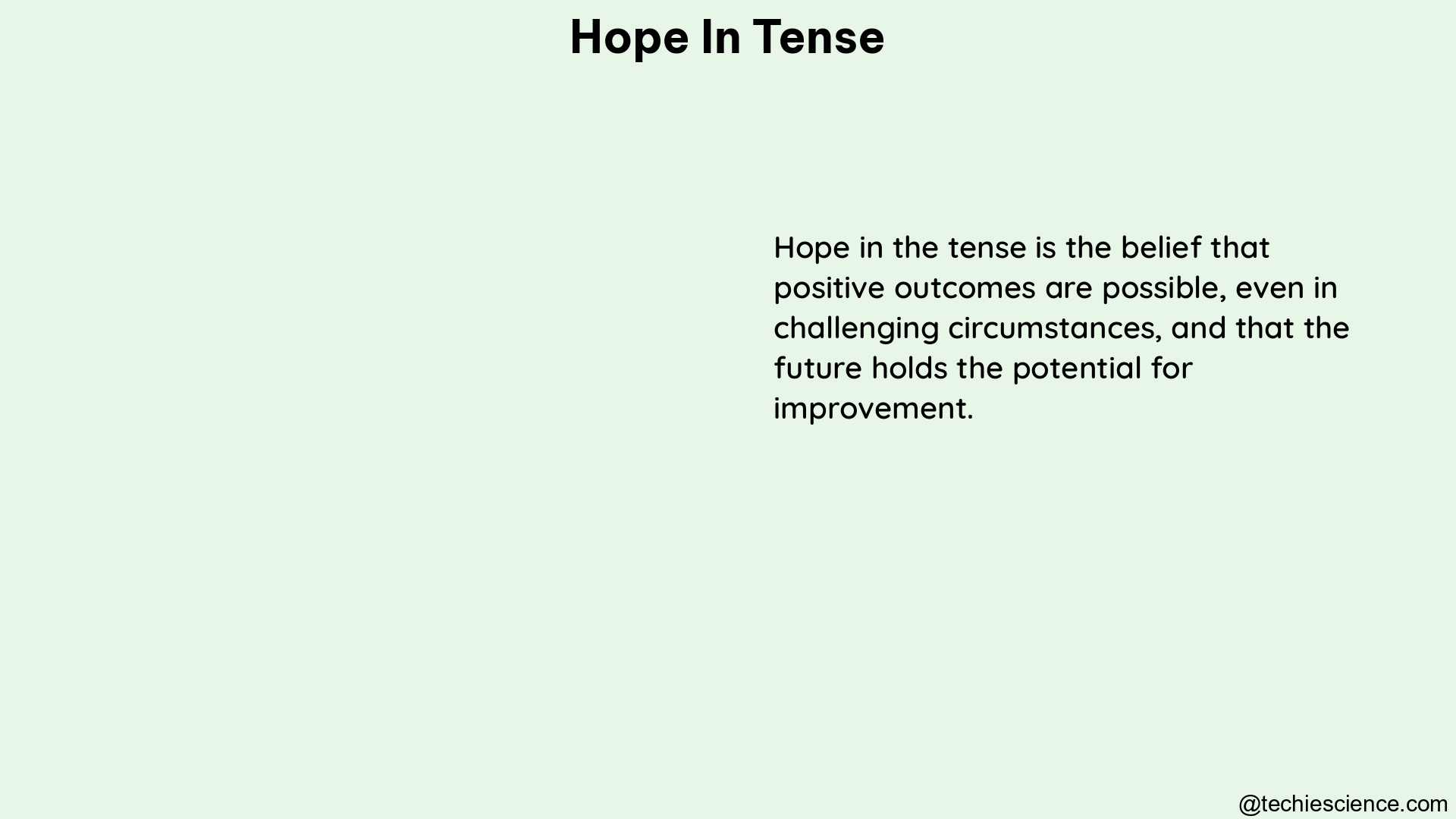The verb “hope” is a versatile word that can be used in various tenses to express different meanings and intentions. Whether you’re expressing a current desire, recounting a past hope, or looking forward to a future possibility, understanding the nuances of using “hope” in different tenses is crucial for effective communication. In this comprehensive guide, we’ll dive deep into the intricacies of using “hope” in the present, past, future, and perfect tenses, providing you with a thorough understanding of this essential aspect of the English language.
Hope in the Present Tense
Present Simple
The present simple tense is used to express current hopes or desires. This tense conveys a sense of immediacy and ongoing relevance.
Examples:
– “I hope you have a good day.”
– “I hope it’s okay with you.”
Present Continuous
The present continuous tense is used to express ongoing or developing hopes.
Examples:
– “I am hoping for a positive outcome.”
– “I am hoping to hear back from them soon.”
Hope in the Past Tense

Past Simple
The past simple tense is used to describe a hope or desire that occurred in the past.
Examples:
– “I hoped to get the job.”
– “I always hoped she would get a new job.”
Past Continuous
The past continuous tense is often used to make polite statements or requests, conveying a sense of ongoing or temporary hope.
Examples:
– “I was hoping to have a word with you.”
– “I was hoping you could help me with this project.”
Hope in the Future Tense
Future Simple
The future simple tense is used to express future hopes or desires.
Examples:
– “I hope we’ll see each other again.”
– “I hope to travel abroad this summer.”
Future Continuous
The future continuous tense is used to express ongoing or persistent future hopes.
Examples:
– “I will be hoping for the best.”
– “I will be hoping to hear from you soon.”
Hope in the Perfect Tenses
Present Perfect
The present perfect tense is used to describe a past hope that still affects the present.
Examples:
– “I have hoped for this opportunity for a long time.”
– “I hope you haven’t got lost.”
Past Perfect
The past perfect tense is used to describe a hope that occurred before another past action.
Examples:
– “I had hoped to finish the project before the deadline.”
– “By the time I arrived, I had hoped the situation would have improved.”
Future Perfect
The future perfect tense is used to describe a future hope that will be fulfilled before another future action.
Examples:
– “I will have hoped for the best by the time the results are out.”
– “By the end of the year, I will have hoped to have made significant progress.”
Special Cases
In Hopes of
The phrase “in hopes of” is used to express a purpose or intention behind an action.
Examples:
– “I went to the game in hopes of seeing Jeremy.”
– “She applied for the scholarship in hopes of pursuing her dream.”
Hoping for the Past
This construction is used to express a current hope about a past event.
Examples:
– “I hope Mila got the scholarship.”
– “I hope the team won the championship last night.”
Key Points to Remember
- Use the present tense to express current hopes or desires.
- Use the past tense to describe hopes or desires that occurred in the past.
- Use the future tense to express hopes or desires that will occur in the future.
- Use the perfect tenses to describe hopes that affect or are affected by other time periods.
- Use “in hopes of” to express a purpose or intention behind an action.
- Use the correct verb forms to express hopes about past events.
Examples
- “I hope you win this tournament.” (Present)
- “I hoped to get the job.” (Past)
- “I hope we’ll see each other again.” (Future)
- “I have hoped for this opportunity for a long time.” (Present Perfect)
- “I went to the game in hopes of seeing Jeremy.” (In Hopes Of)
- “I hope Mila got the scholarship.” (Hoping for the Past)
References
- Grammarist: How to Use Hope Correctly – Examples
- WordReference: Conjugation of hope
- Speak Confident English: How to Talk about Hope in English | Present, Past, and Future
Hi… I am Sowndharya Jagadeeswaran, a university rank holder in M.A. English Literature. I have also done my master’s in Business Administration. Inquisitive as I am, my interest in action-oriented research helped me publish research papers in reputed journals. Now, as a career, I am an instructor where I teach young and adorable students the intricate technicalities of Public Speaking and Creative Writing. I also enjoy writing articles on topics I specialize and research in.
You can connect with me through LinkedIn.-